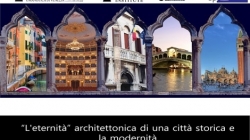A Venetian experience for the student-architects of Timișoara
A Venetian experience for the student-architects of Timișoara
A group of 35 students of the Faculty of Architecture and Urbanism of Politehnica University Timisoara had the opportunity to live a very useful and interesting experience in Venice, where he got in touch with the specific architecture, but also with the modalities of conservation, restoration and refunctionalization of historical buildings.
The Romanian Institute of Culture and Humanistic Research in Venice, in collaboration with Politehnica University Timisoara (UPT) and the Faculty of Architecture and Urbanism within the UPT, organized a master-class working meeting, consisting of three pilot interventions on the particular case. of Venice in the collective imagination and in the history of urbanism and architecture.
The event, addressed to students from years I, II, III and IV from the Faculty of Architecture and Urbanism of Politehnica University Timisoara, coordinated by the architect Cristina-Maria Povian, was held on Thursday, September 19, 2019, in the Conference Room of the Romanian Institute of Culture and Humanistic Research.
The young students had the opportunity to know some of the most significant experiences that respond, on the one hand, to the conservation requirements of the famous architectural monuments in the historical center of Venice and, on the other, to the needs of transforming the functionality of the degraded buildings from the perspective of the re-inscription. in the urban space, in a manner corresponding to the new course of the qualitative evolution of infrastructures and urban imposed by the advance of technologies 5.0.
Prof. Grigore Arbore Popescu, PhD, historian of art and architecture, former teacher of the University Institute of Architecture of Venice - IUAV and emeritus researcher of the National Research Council of Italy, presented the socio- economic and historical context in which the myth of Venice was formed as " ideal fortress ”(myth comparable to those built around“ fortresses ”Athens and Rome). In this context, the role of the Venetian architects in defining the urban space as a space of sustainable creations, meant to withstand the adversities of the times, having the vocation of "eternalization", as well as the "Mediterranean empire" of Serenisima.
Also, Roberto D'Agostino, renowned architect and urbanist, excellent connoisseur of the millennial evolution of the urban fabric of Venice, defined the characteristics of the relationship between "freezing in the past" and modernity in the current phase of the urban aspect of Venice, and prof. arch. Francesco Amendolagine, PhD, (former professor at the IUAV and tenured professor in the Department of Architecture History at the Faculty of Architecture of the University of Udine, with unparalleled practical experience in the field of designing, restoring and refunctioning the historical architectures) presented the reasons for conditioning the aspect of the Venetian urban conglomerate by historical architecture of the XII-XVIII centuries and analyzed two limit cases of restoration in the circuit of civic life of two buildings with special functions.
Through this manifestation, the IRCCU wanted to stimulate the deepening, by the young Romanian architects, of the problems of modernizing the urban fabrics of a country with edifying experiences in this field.





















